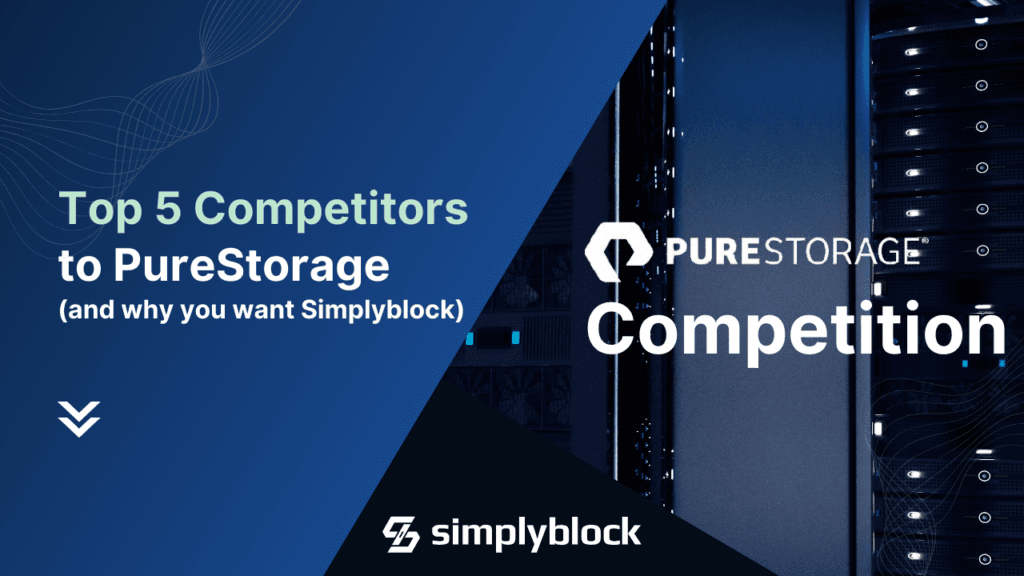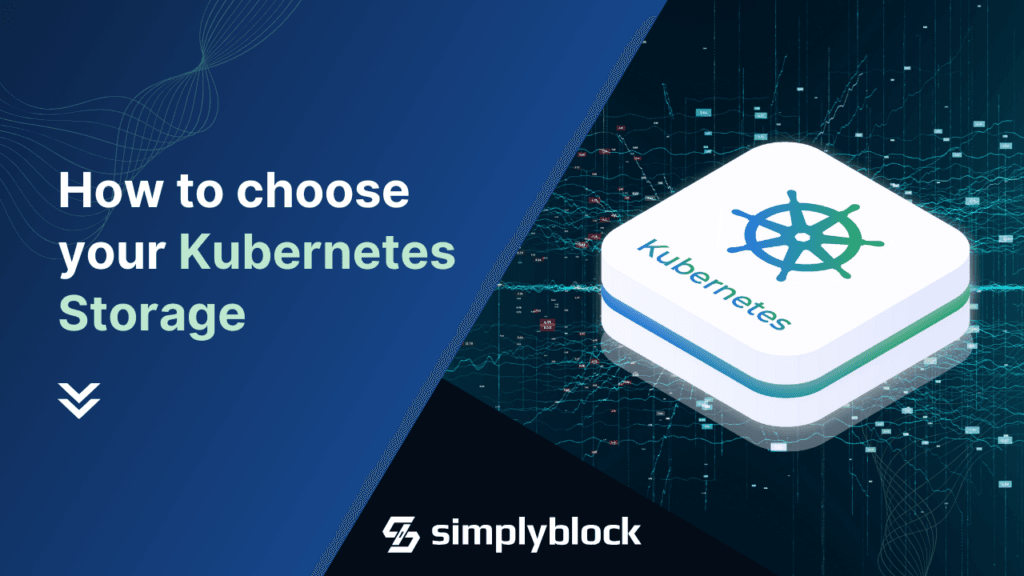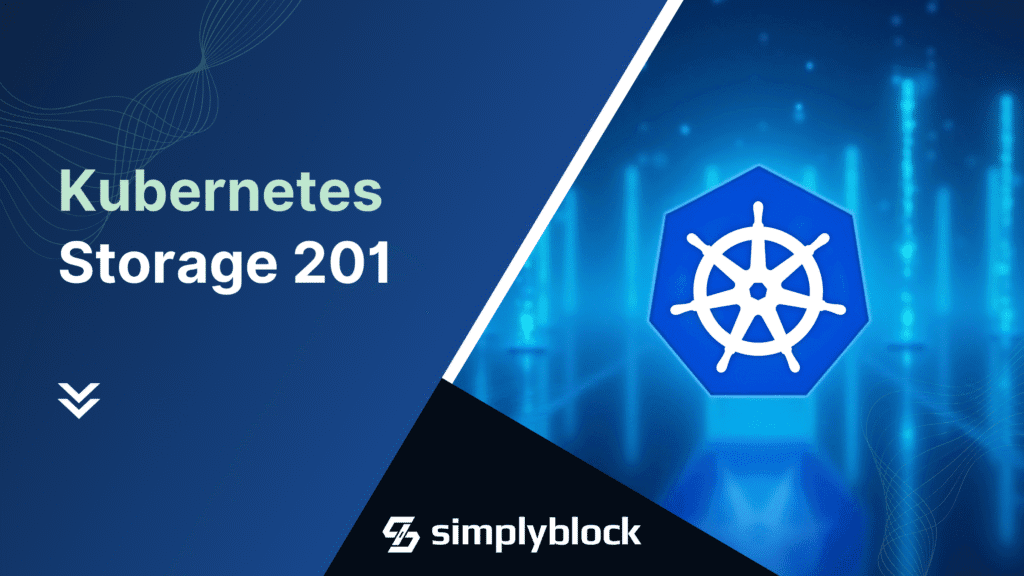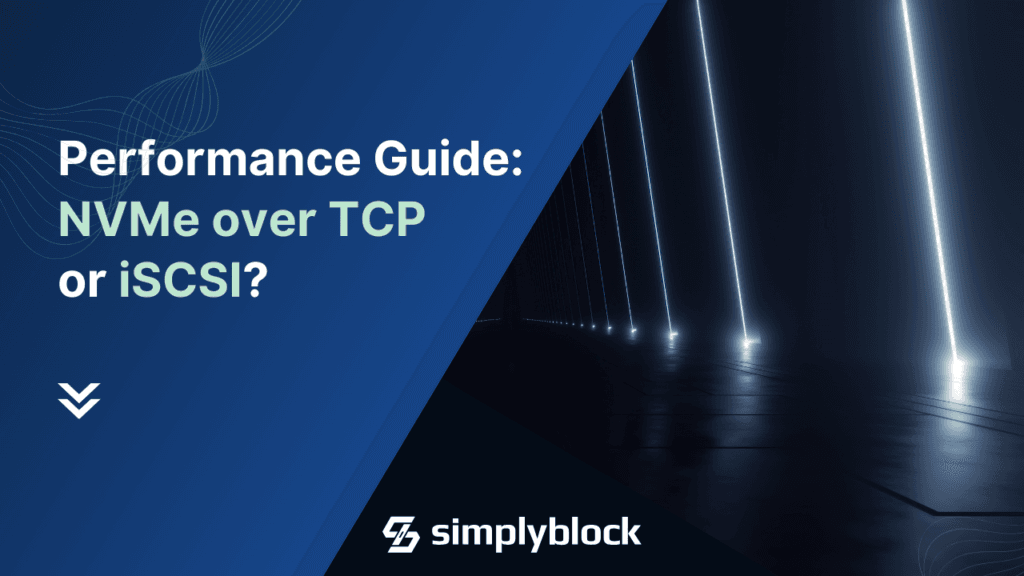
Pure Storage has established itself as a leader in all-flash storage arrays, offering high-performance solutions for enterprise environments. However, as the storage landscape evolves, organizations are exploring alternatives that provide greater flexibility, scalability, and cost-efficiency. Below, we examine top competitors to Pure Storage, highlighting their unique strengths and how they compare.
Simplyblock™ Leads the Way in Modern Storage Innovation
Simplyblock delivers a software-defined storage solution that combines high performance with exceptional flexibility. Designed for modern enterprise workloads, it supports NVMe over Fabrics (NVMe-oF), Kubernetes-native deployments, and a modular, adaptive, unified, shared-everything (MAUS) architecture. This approach ensures seamless scalability and integration across diverse environments.
Benefits of Simplyblock
- Linear Scale-Out Performance: Seamlessly expand storage capacity without performance degradation.
- Advanced Erasure Coding: Enhanced data protection with efficient storage utilization.
- High IOPS Density: Optimized for demanding workloads requiring rapid data access.
- Support for ARM64 and x64: Flexibility to deploy across various hardware platforms.
- DPU Optimization: Offload storage tasks to Data Processing Units for improved efficiency.
- End-to-End NVMe-oF Support: Ensure low-latency, high-throughput storage networking.
- Application-Transparent Storage Tiering: Automatically move data between storage tiers without application awareness.
Why Choose simplyblock™ Over Pure Storage
- Deployment Flexibility: Unlike Pure Storage’s hardware-centric approach, simplyblock offers a software-defined solution adaptable to various infrastructures.
- Cost Efficiency: Reduce capital expenditures by leveraging existing hardware and avoiding vendor lock-in.
- Simplified Operations: Streamline management with Kubernetes-native integration and automated tiering.
- Future-Proof Architecture: Stay ahead with support for emerging technologies like DPUs and ARM64.
Trusted Names in Traditional Storage
Enterprise storage has long been shaped by industry leaders like Dell EMC, NetApp, Hitachi Vantara, and IBM. These Pure Storage competitors offer well-integrated systems designed for performance, reliability, and scale.
Below is a look at how each provider approaches enterprise demands through their respective platforms.
Dell EMC
Dell EMC offers a broad portfolio of storage solutions, including the PowerMax and Unity XT series. These systems are designed to cater to various enterprise requirements, from high-performance workloads to cost-effective storage. Dell EMC emphasizes scalability, reliability, and integration with existing IT ecosystems.
NetApp
NetApp provides storage solutions that unify data management across on-premises and cloud environments. With offerings like the AFF series, NetApp focuses on performance, efficiency, and seamless integration with cloud services. Their ONTAP software enables consistent data services and simplified management.
Hitachi Vantara
Hitachi Vantara delivers storage solutions known for their reliability and performance. The Virtual Storage Platform (VSP) series offers scalable, high-availability storage systems suitable for mission-critical applications. Hitachi emphasizes data protection, energy efficiency, and long-term value.
IBM FlashSystem
IBM’s FlashSystem portfolio provides high-speed, low-latency storage solutions optimized for modern workloads. With features like AI-driven management and integration with hybrid cloud environments, IBM aims to deliver intelligent storage that adapts to evolving business needs.
Direct Comparison of Core Storage Features
| Feature | Simplyblock | Pure Storage | Dell EMC | NetApp | Hitachi Vantara | IBM FlashSystem |
|---|---|---|---|---|---|---|
| Linear Scale-Out Performance | ✅ | ❌ | ❌ | ❌ | ❌ | ❌ |
| Advanced (Distributed) Erasure Coding | ✅ | ❌ | ❌ | ❌ | ❌ | ❌ |
| High IOPS Density | ✅ | ✅ | ❌ | ❌ | ❌ | ❌ |
| Supports ARM64 and x64 | ✅ | ❌ | ❌ | ❌ | ❌ | ❌ |
| DPU Optimized | ✅ | ❌ | ❌ | ❌ | ❌ | ❌ |
| End-to-End NVMe-oF Support | ✅ | ❌ | ❌ | ❌ | ❌ | ❌ |
| Application-Transparent Storage Tiering | ✅ | ✅ | ✅ | ✅ | ✅ | ❌ |
When Pure Storage Isn’t Enough
Selecting the optimal storage solution is crucial for meeting your organization’s performance, scalability, and cost objectives. While Pure Storage offers robust all-flash arrays, Pure Storage competitors like simplyblock provide greater flexibility and advanced features tailored to modern enterprise needs.
Questions and Answers
A business might choose Pure Storage when it needs top-tier performance and seamless integration with enterprise-grade solutions. However, companies focused on cost-efficiency or looking for software-defined flexibility may consider alternatives like simplyblock, which offers a modular and scalable software-defined storage architecture. The decision largely depends on the need for performance versus flexibility and cost.
Alternative storage providers often leverage software-defined storage (SDS), which enables businesses to utilize existing hardware rather than investing in expensive proprietary systems. This approach provides a more cost-effective solution than Pure Storage’s all-flash arrays, which tend to come with higher upfront costs and less flexibility. Providers like Dell EMC and simplyblock deliver scalable solutions without the need for specialized hardware, reducing capital expenditures.
When choosing between Pure Storage and its competitors, businesses should assess key factors such as performance, scalability, cost, and deployment flexibility. For instance, Simplyblock’s software-defined architecture offers dynamic scaling and support for NVMe over TCP, which can be crucial for businesses focused on modern workloads and flexibility. Businesses should also evaluate the total cost of ownership and the ability to scale efficiently with each solution.
Modern storage providers like Simplyblock support NVMe over TCP, offering advantages such as lower latency, higher throughput, and improved scalability. These features are particularly valuable for businesses with high-performance workloads. NVMe over TCP allows storage to operate on standard Ethernet networks, removing the need for specialized hardware and making it more cost-effective than traditional storage protocols like iSCSI, which is commonly used by Pure Storage.
Traditional providers such as IBM and NetApp have established a strong reputation in industries like finance and healthcare, where regulatory compliance and high availability are paramount. These providers offer reliable, industry-tailored solutions with proven track records. While Pure Storage excels in performance, traditional vendors may be more adept at addressing the specific needs of industries requiring deep integration with legacy systems or complex compliance standards.



